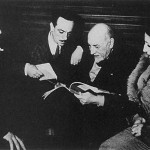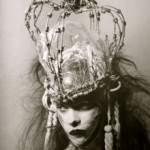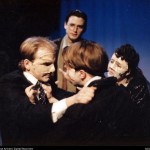As mentioned in my previous post, Yeats’s concept of the self and its anti-self (the mask) means that man is, in fact, two men. It also means that they belong to different fields of life, while being strongly connected to one another—the self is stuck in ordinary life, while the anti-self appertains to the fields of art and dreams. And this can be applied also to Pirandello’s persona and personaggio. For both authors, the anti-self (or personaggio) has an artistic personality, which means that in their dramas those characters who assume the mask of their ordinary selves are excellent actors who create their own micro-theatre within the plays. However, those characters who are stuck in their ordinary selves cannot comprehend the complexity of the personaggio characters. As a result, the personas regard the personaggios as mad people.


In Pirandello’s Six Characters, for instance, the actors—though appearing to be good actors—have no artistic personality, while the six characters (the personaggio figures), though seeming ordinary people, are excellent actors. What the personas do is merely a so called “giuoco d’arte,” that is, the simulation of real art, while the acting of the six characters is art incarnated. They claim that they were born for the stage, and that they would like to see their tragic story realized on the stage, asking the Manager to stage their story, and the actors to play them. What is more, the characters declare that they are, in fact, living in the actors—a concept which highlights Yeats’s and Pirandello’s idea according to which the self (persona) and the anti-self (personaggio) are integrated into one another in our personality. However, the Manager and his actors show no willingness to understand these ideas, and poke fun at the six characters, regarding them as mad people.


In Yeats’s The Player Queen, Decima (the character who can reach her anti-self) also becomes an excellent actress. She dreams of becoming a grand queen; she sees but this one dream in her mind’s eyes since her childhood. However, those characters who cannot escape from their selves consider Decima a madwoman. Such character is Nona who scornfully asks Decima: “You play a queen’s part? You that were born in a ditch between two towns […]?” The actors are about to start the rehearsal of a play in which they give Decima a marginal role. However, Decima creates her own micro-theatre and oppresses everybody, thus reaching her dream, and becoming the player queen. She perceives that the real queen feels uncomfortable in her position, and therefore they change places with each other, and Decima becomes a grand sovereign—she assumes the mask of her ordinary self.
If you acquired taste for this topic, read my following post as well in which I will show you how the personaggio characters deprive the Stage Managers of their roles and become the personas’ relentless puppet-masters.
Sources:
1.http://www.thebuzzfromsydney.com/ 3. nativecore.tumblr.com 5. http://hdl.handle.net/10267/12389
2. wikipedia.com 4. http://hdl.handle.net/10267/12386

